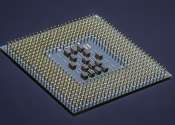Chip firms play down Ukraine war supply fears
The tech industry is playing down fears of widespread raw materials shortages as a result of the war in Ukraine, after reports that chipmakers would face a severe crunch.
Mar 1, 2022
0
4
Business

The tech industry is playing down fears of widespread raw materials shortages as a result of the war in Ukraine, after reports that chipmakers would face a severe crunch.
Mar 1, 2022
0
4
Business

Taiwan Semiconductor Manufacturing Co., the world's biggest contract producer of processor chips, said Friday its revenue rose 16.7% in the latest quarter over a year ago as the global economy rebounded from the coronavirus ...
Apr 9, 2021
0
5
Business

Taiwan Semiconductor Manufacturing Company said Thursday it was planning to invest $100 billion over the next three years to meet soaring demand as a global shortage of chips hits the auto and other industries.
Apr 1, 2021
0
4
Business

U.S. chipmaker Intel unveiled plans on Tuesday to invest up to 80 billion euros ($88 billion) across Europe as part of an ambitious expansion aimed at evening out imbalances in the global semiconductor industry that have ...
Mar 15, 2022
0
73
Business

Malaysia's leader on Monday announced plans to build a massive semiconductor design park, aiming to boost the Southeast Asian nation's role in the global chip industry.
Apr 22, 2024
0
4
Electronics & Semiconductors

US chip-maker Onsemi will invest up to $2 billion to expand its plant in the Czech Republic, the biggest investment in the country's modern history, the industry minister said Wednesday.
Jun 19, 2024
0
21
Electronics & Semiconductors

Taiwan Semiconductor Manufacturing Co., the biggest contract manufacturer of processor chips, reported Thursday its quarterly profit rose 16.4% over a year earlier to $6 billion amid surging demand for chips for smartphones ...
Jan 13, 2022
0
4
Hi Tech & Innovation

(Tech Xplore)—Apple to the core of the public's brand recognition is primarily phones, laptops, tablets and their varied accessories. So why did Apple file a patent application in July last year, and released on January ...
Business

Taiwanese semiconductor giant TSMC said Thursday its August revenue rose nearly 60 percent to a record high of Tw$218.13 billion ($7.06 billion) on soaring global demand.
Sep 8, 2022
0
13
Electronics & Semiconductors

German technology company Bosch on Monday opened a 1 billion euro ($1.2 billion) chip factory in the eastern city of Dresden to help meet the growing demand for semiconductors.
Jun 7, 2021
0
6
A semiconductor is a material that has a resistivity value between that of a conductor and an insulator. The conductivity of a semiconductor material can be varied under an external electrical field. Devices made from semiconductor materials are the foundation of modern electronics, including radio, computers, telephones, and many other devices. Semiconductor devices include the transistor, solar cells, many kinds of diodes including the light-emitting diode, the silicon controlled rectifier, and digital and analog integrated circuits. Solar photovoltaic panels are large semiconductor devices that directly convert light energy into electrical energy. In a metallic conductor, current is carried by the flow of electrons. In semiconductors, current can be carried either by the flow of electrons or by the flow of positively-charged "holes" in the electron structure of the material.
Silicon is used to create most semiconductors commercially. Dozens of other materials are used, including germanium, gallium arsenide, and silicon carbide. A pure semiconductor is often called an “intrinsic” semiconductor. The conductivity, or ability to conduct, of semiconductor material can be drastically changed by adding other elements, called “impurities” to the melted intrinsic material and then allowing the melt to solidify into a new and different crystal. This process is called "doping".
This text uses material from Wikipedia, licensed under CC BY-SA